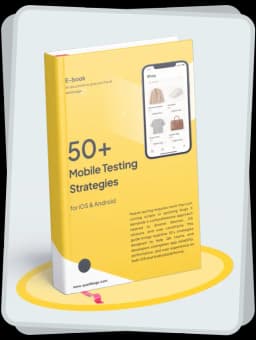The Effective Method for Quality Assurance
AI in mobile app testing is revolutionizing quality assurance, tools such as SofySense, Mabl, and Appitools that automate testing and prediction processes, ensuring apps meet the highest standards of performance and security. These AI-driven methods not only speed up the testing cycle but also significantly reduce the manual effort required by simulating real-world user scenarios and improving test coverage.
Incorporating AI-powered testing techniques into the development lifecycle enables teams to leverage continuous testing, regression testing, and usability testing, ensuring that apps are rigorously tested across diverse conditions and test environments. This approach not only streamlines the test creation and execution process but also enhances the ability of developers to deliver high-quality native mobile apps with fewer errors, better test insights, and optimal user experience.
Current State and Challenges in Mobile App Testing
The mobile app market is experiencing unprecedented growth, with downloads reaching a staggering 255 billion in 2022. Despite this surge, maintaining user engagement poses a significant challenge, as evidenced by the fact that 94% of users uninstall mobile apps within 30 days, and only 25% revisit them after their initial engagement [1]. This scenario underscores the critical importance of effective mobile app testing, which aims to ensure that apps meet user expectations and function according to specifications.
Mobile Testing Trends and Spending
Continuous Integration/Delivery Pipelines : Facilitates seamless app updates.
Scriptless Testing : It can record a tester’s actions on the application screens as they navigates through features. The tool will generate the test steps by recording these actions.
Artificial Intelligence & Cloud-Based Testing : Enhances efficiency and coverage.
The sales of mobile application testing solutions grew at a rate of 13.9% between 2019 and 2023. The overall market value was about US$ 5.87 billion by 2023.
Automation and AI Integration
Automation Adoption : 97% of QA professionals are now utilizing test automation for its speed and cost-effectiveness.
AI and ML in Testing : Transforming test automation, regression testing, and user experience testing through predictive analysis and intelligent test generation.
The evolution of mobile app testing is driven by rapid technological advancements and the need for a competitive edge in the app market. Companies are increasingly adopting automated testing tools like Appium, Espresso, and XCTest, and integrating AI and ML to streamline test creation, execution, and user experience evaluation. This shift towards innovative testing methodologies is essential for delivering high-quality mobile applications that satisfy user demands and withstand the competitive pressures of the app market.

Get the Mobile Testing Playbook Used by 800+ QA Teams
Discover 50+ battle-tested strategies to catch critical bugs before production and ship 5-star apps faster.
How AI Transforms Mobile App Testing
AI transforms mobile app testing by introducing efficiency and precision that was previously unattainable. Key innovations include:
Automated Test Script Generation and Adaptation : Tools like Sofy, Mabl, and Applitools automate the creation and adaptation of test scripts, significantly reducing manual effort and increasing test coverage. These tools can automatically adjust to UI changes, ensuring tests remain relevant and accurate.
Enhanced Test Data Generation : AI generates realistic user profiles, transactions, and scenarios, improving the app’s performance and security testing. This approach ensures that apps are tested under conditions that closely mimic real-world usage, leading to more reliable outcomes.
Visual Regression and Layout Testing : Visual AI tools compare current app screenshots against baseline images to identify visual regressions, layout issues, or rendering problems. This capability is crucial for maintaining the visual integrity of the app across different devices and screen sizes.
Intelligent Test Case Management : Using NLP, testers can write test cases in plain language, which AI then converts into automated test scripts. This simplifies the test creation process and makes it more accessible to testers without extensive coding knowledge.
Prioritization and Prediction : AI algorithms prioritize test cases based on historical data, code changes, and associated risks. This strategic approach ensures that testing efforts are focused on the areas most likely to contain defects or require attention.
Performance and Security Testing : AI-driven tools simulate virtual users and network conditions to identify performance bottlenecks and security vulnerabilities, ensuring the app can handle expected loads and protect user data.
By incorporating these AI-powered techniques, mobile app testing becomes a more streamlined, accurate, and efficient process, enabling faster releases and higher-quality applications.
Leveraging AI for Optimization and Efficiency
Leveraging AI for optimization and efficiency in mobile app testing involves several cutting-edge tools and techniques designed to streamline the testing process, enhance accuracy, and ultimately deliver a superior user experience. Here's how AI is making a significant impact:
AI-Powered Test Automation Tools : Tools like Applitools, Test.ai, and Sealights utilize AI to automate test creation, execution, and analysis. They save time and effort for developers by learning from previous test results, thereby improving future test accuracy and enhancing user experience.
Visual Testing and Accessibility : AI-driven visual testing tools such as Percy and Screener analyze screenshots to detect visual defects, ensuring app consistency across all devices and platforms. Moreover, they assess accessibility issues like color contrast and font size, aiding developers in making apps more accessible to users with disabilities.
Test Suite Optimization : AI-powered tools like Testim and Functionize optimize test suites by analyzing data from previous tests. This helps in identifying critical areas of the app, allowing developers to focus their testing efforts more effectively.
By integrating these AI-enabled tools into the mobile app testing workflow, developers can achieve higher efficiency, better test coverage, and a more robust final product.




